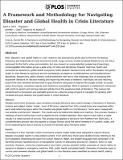| dc.description.abstract | Both ‘disasters’ and ‘global health in crisis’ research has dramatically grown due to the ever-increasing frequency and magnitude of crises around the world. Large volumes of peer-reviewed literature are not only a testament to the field’s value and evolution, but also present an unprecedented outpouring of seemingly unmanageable information across a wide array of crises and disciplines. Disaster medicine, health and humanitarian assistance, global health and public health disaster literature all lie within the disaster and global health in crisis literature spectrum and are increasingly accepted as multidisciplinary and transdisciplinary disciplines. Researchers, policy makers, and practitioners now face a new challenge; that of accessing this expansive literature for decision-making and exploring new areas of research. Individuals are also reaching beyond the peer-reviewed environment to grey literature using search engines like Google Scholar to access policy documents, consensus reports and conference proceedings. What is needed is a method and mechanism with which to search and retrieve relevant articles from this expansive body of literature. This manuscript presents both a framework and workable process for a diverse group of users to navigate the growing peer-reviewed and grey disaster and global health in crises literature.
Methods:
Disaster terms from textbooks, peer-reviewed and grey literature were used to design a framework of thematic clusters and subject matter ‘nodes’. A set of 84 terms, selected from 143 curated terms was organized within each node reflecting topics within the disaster and global health in crisis literature. Terms were crossed with one another and the term ‘disaster’. The results were formatted into tables and matrices. This process created a roadmap of search terms that could be applied to the PubMed database. Each search in the matrix or table results in a listed number of articles. This process was applied to literature from PubMed from 2005-2011. A complementary process was also applied to Google Scholar using the same framework of clusters, nodes, and terms expanding the search process to include the broader grey literature assets.
Results:
A framework of four thematic clusters and twelve subject matter nodes were designed to capture diverse disaster and global health in crisis-related content. From 2005-2011 there were 18,660 articles referring to the term [disaster]. Restricting the search to human research, MeSH, and English language there remained 7,736 identified articles representing an unmanageable number to adequately process for research, policy or best practices. However, using the crossed search and matrix process revealed further examples of robust realms of research in disasters, emergency medicine, EMS, public health and global health. Examples of potential gaps in current peer-reviewed disaster and global health in crisis literature were identified as mental health, elderly care, and alternate sites of care. The same framework and process was then applied to Google Scholar, specifically for topics that resulted in few PubMed search returns. When applying the same framework and process to the Google Scholar example searches retrieved unique peer-reviewed articles not identified in PubMed and documents including books, governmental documents and consensus papers.
Conclusions:
The proposed framework, methodology and process using four clusters, twelve nodes and a matrix and table process applied to PubMed and Google Scholar unlocks otherwise inaccessible opportunities to better navigate the massively growing body of peer-reviewed disaster and global health in crises literature. This approach will assist researchers, policy makers, and practitioners to generate future research questions, report on the overall evolution of the disaster and global health in crisis field and further guide disaster planning, prevention, preparedness, mitigation response and recovery. | en_US |


